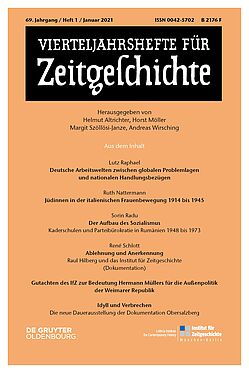- The Institute
- Research
- Dictatorships in the 20th Century
- Democracies and their Historical Self-Perceptions
- Transformations in Most Recent History
- International and Transnational Relations
- Edited Source Collections
- Dissertation Projects
- Completed Projects
- Dokumentation Obersalzberg
- Center for Holocaust Studies
- Berlin Center for Cold War Studies
- Publications
- Vierteljahrshefte
- The Archives
- Library
- Center for Holocaust Studies
- News
- Dates
- Press
- Recent Publications
- News from the Institute
- Topics
- Munich 1972
- Confronting Decline
- Feminist, Pacifist, Provocateur
- Der Mauerbau als Audiowalk
- Digital Contemporary History
- Transportation in Germany
- Envisaged Futures at the End of the Cold War
- From the Reichsbank to the Bundesbank
- German Federal Chancellery
- History of Sustainabilities: Discourses and Practices since the 1970s
- Changing Work
- Democratic Culture and the Nazi Past
- The History of the Treuhandanstalt
- Foreign Policy Documentation (AAPD)
- Dokumentation Obersalzberg
- Hitler, Mein Kampf. A Critical Edition
- "Man hört, man spricht"
- IfZ
- Vierteljahrshefte
- VfZ Archive
- Issue Index
- 2021
- Issue January 2021
Issue 1/2021
Content Overview: English Titles and Abstracts:
- Lutz Raphael: German Working Environments Between Global Challenges and National Reactions. Perspectives of Contemporary Historiography. - Newpaper Article Frankfurter Allgemeine Zeitung
- Ruth Nattermann: Emancipatory Awakening and Antisemitic Persecution. Jewish Women in the Italian Women’s Movement, 1914 to 1945.
- Sorin Radu: Building the Socialism. The Schools of Cadres and the Party Bureaucracy in Romania ‒ Regional Party School of Timișoara, 1948 to 1973. - Additional Material
- René Schlott: Rejection and Recognition. Raul Hilberg and the Institute for Contemporary History. - Additional Material
- A Social Democrat in the Foreign Office. Expertise of the Leibniz-Institute for Contemporary History on the Significance of Hermann Müller for the Foreign Policy of the Weimar Republic.
- Idyll and Atrocity. The New Permanent Exhibition of the Dokumentation Obersalzberg.
Abstracts
Lutz Raphael, German Working Environments Between Global Challenges and National Reactions. Perspectives of Contemporary Historiography
Historical studies on working environments in Germany are experiencing a revival after the running out of the classical social historical and labour movement historical studies on the German industrial age (1880–1970). The new projects are shaped by the upheaval of the present: competing research interests between global and national history, between a radical expansion of the research topic to cover every sort of activity and a concentration on forms of gainful employment. The article makes the case for the innovative potential of a new history of labour as a conceptual history of the present in the fields of gender history, the history of class and inequality, national labour policies, the micro-politics in businesses as well as the knowledge systems of professional environments.
Ruth Nattermann, Emancipatory Awakening and Antisemitic Persecution. Jewish Women in the Italian Women’s Movement, 1914 to 1945
On the basis of newly accessible sources, the article investigates the experiences of Italian-Jewish feminists between emancipatory awakening and antisemitic persecution. The focus lies on the phase between the beginning of the First World War and 1945. The examination reveals the rising tensions in emancipatory processes between participation, dissociation and anti-Jewish hostility. The marginalisation, the deprivation of rights and persecution during the Fascist dictatorship are explicitly viewed from the perspective of Jewish women. Despite their important influence on the development of the Italian Women’s Movement and its distinctly transnational orientation, their emancipation as women as well as Jewesses remained incomplete.
Sorin Radu, Building the Socialism. The Schools of Cadres and the Party Bureaucracy in Romania ‒ Regional Party School of Timișoara, 1948 to 1973
The political training of the elites of communist parties, of the party bureaucrats, through schools of cadres is a topic which may enhance our knowledge of the way in which communism worked in the Eastern Block and of the dynamic relationship between state and society. Such an approach allows the researcher to understand the universe of the party apparatus and affords the possibility to generate a more complex profile of this world and, last but not least, to comprehend the internal mechanisms of the ruling party. This is why researching the political and ideological education represents a necessary step for a detailed history of the East-European communism. The article focuses on a partial investigation of the regional Party school of Timișoara in the years 1948‒1973, which trained the Party activists and administrative officers – “second-class elites” – politically and ideologically.
René Schlott, Rejection and Recognition. Raul Hilberg and the Institute for Contemporary History
In 2017 the publication history of Raul Hilberg’s “The Destruction of the European Jews” caused quite a stir, when two expert opinions were published, in which historians of the Institute for Contemporary History (IfZ) advised against translating the work into German. At the time many important questions remained unanswered, which are now addressed in the present documentation on the basis of new archival finds from the publisher archives of C.H.Beck and Droemer Knaur. Additionally, an exchange of letters has cropped up in the Ino Arndt papers, in which the author of the already known 1980 expert opinion corresponded with the publishing company Darmstädter Blätter about a possible translation of Hilberg’s book and pointed towards the connected costs. Thus there are now three known rejections from the IfZ. At the same time other sources show, that Hilberg’s work enjoyed appreciation and recognition by the IfZ. The relationship between Hilberg and the Munich Institute thus remains ambivalent.









